A PREMIUM TIMES investigation found that contrary to official denials, the military bombed a civilian community and killed six children.
On one mid-April morning at Kurebe community in the Shiroro area of Niger State, six girls were running after one another, carefree, in a manner expressive of the innocent exuberance of kids. As they huddled together at a borehole, which they had friskily raced to, a military fighter jet appeared high overhead, apparently hunting for military targets in an area that has fallen to the grips of the extremist violent group Boko Haram.
Then, the roaring jet belonging to the Nigerian Air Force dropped explosive artillery shells covering the atmosphere with smoke as trees fell on roofs, forcing everyone to scamper for safety. In the wake of the bombing, the air force had killed the six children. And when parents and residents reached the borehole where the kids had huddled together, they were only able to collect their torn remains.
As PREMIUM TIMES’ investigation revealed, the air force had worked with the intelligence – which our findings showed was bogus – that all human beings in Kurebe are terrorists. PREMIUM TIMES conducted on-the-ground reporting in the community and interviewed multiple civilian residents, farmers, and traders, who are already affected by terrorists.
But even if the intelligence was credible, children are not to be targeted in war situations, experts say, with residents decrying competence crisis in the military and lack of respect for international laws and conventions.
After their torn remains were collected, Maryam Lawal, Hafeezah Basiru, Shamsiyah Lawal, Shafaatu Jamilu, Asmau Isa, and Hakumi Danlami were buried in three graves dug by their parents and residents in three batches.
“We were hardly able to identify the children after the shrapnels tore apart their bodies,” Musa Dobi, one of the relatives of the bombed kids, told PREMIUM TIMES.
Mr Dobi wore a smiling face as tears rolled down his cheek. He said his mixed gestures were a show of mixed emotions when asked why he appeared crying and smiling at the same time.
“They killed my niece and five other girls during a raid on our village and denied it,” the man said in the Hausa language. “Now we don’t know whom to fear between the militants and the military.”
The deadly denial
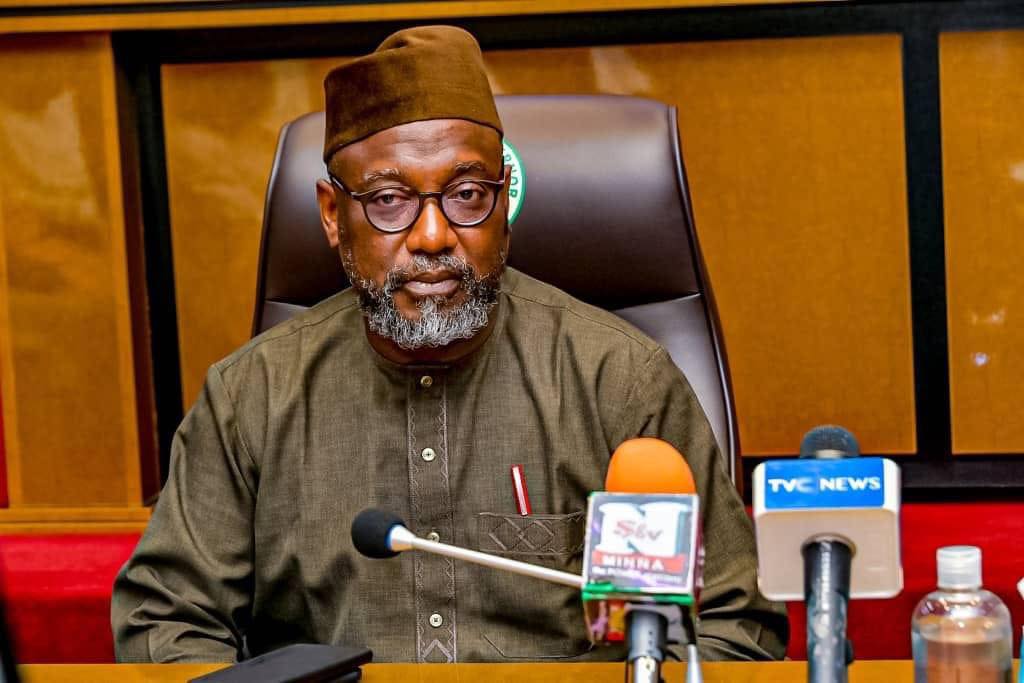
On April 21, the news of the military airstrike in Kurebe dominated the media space. Salis Sabo, a youth leader in Shiroro, had broken the story to journalists, expressing his grief over the incident and calling on authorities to show accountability. Mr Sabo, on behalf of the Coalition of Shiroro Associations, a group of concerned youths in the state, had informed the public that the incident occurred on April 13, a week before the news broke.
Kurebe, a community in the remote area of Shiroro, is ravaged by Boko Haram terrorists, who commit atrocious crimes, including rape, kidnapping for ransom, murders, and forcibly recruiting boys into violent extremism.
“We continue to vent, spleen, raise dust and even bring down the roof when the occasion calls for that — to get the government to do what it has sworn to do,” Mr Sabo said in a statement. “However, the continued pampering of these nefarious vermin who inflict terror straight from the gutter will leave us with so much to be inferred.”
The activities of the bandits provoked military action. But it went wrong that April 13 morning.
On April 22, Ahmed Matane, the secretary to the Niger State Government, described news reports that claimed children were killed by the air force jet in Kurebe as “fake news”. Mr Matane wondered how newspaper outfits could have published such a sensitive security report without “proper confirmation”.
He lied, PREMIUM TIMES can report.
The costly cover-up
Disgruntled by the state government’s denial, a group of youth in Shiroro led by Mr Sabo, assembled journalists in Minna and asked parents of the victims to come to the state capital to give accounts of the military raid in Kurebe. However, the government moved to scuttle the arrangement by ordering Kurebe’s local monarch to “stop the parents from coming to Minna to grant such an interview with the media,” Mr Sabo said.
“So, the parents of the killed children had to go back following the order from the government,” Mr Sabo said, echoing the claim by other youth PREMIUM TIMES interviewed in the state. “That was how they buried the matter up till now.”
Several local journalists in the state who tried to investigate the matter said their mission was futile because power-wielding individuals have blocked every means of evidence gathering. “The state government is really interested in the matter and does not want any story on it,” one local journalist in the state told PREMIUM TIMES. “That is why you see that everyone is silent on the matter as if nothing happened.”
NAF also denies
On May 9, PREMIUM TIMES placed a call to Edward Gabkwet, the spokesman of the Nigerian Air Force, to get the military’s side of the story but our correspondent was met with a rather elusive response. Since the incident happened a few weeks earlier, the air force had kept mum over the matter and failed to take responsibility for bombing the innocent children.
When reached for his official statement, Mr Gabkwet asked our reporter to “stay with what the Niger government said” on the incident.
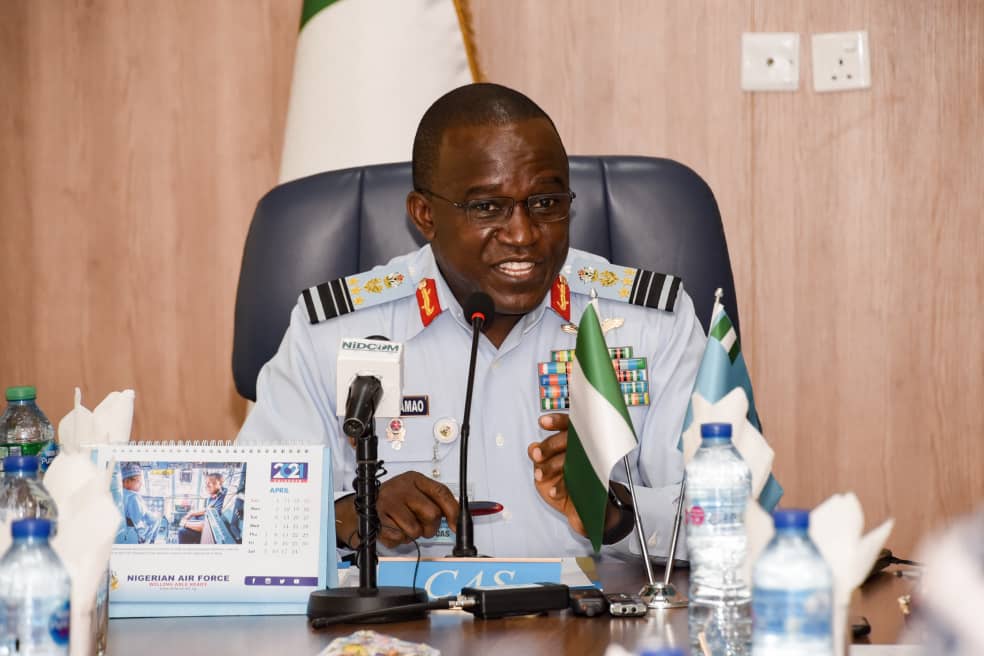
“Work with what the state government said on it and stop sniffing around for what you want to hear, do you understand me?” the NAF spokesperson, an air commodore, told PREMIUM TIMES in a telephone conversation. “What else do you want to hear? The SSG came out and told you that these allegations are unfounded, so what else do you want to hear from us? They own the state.”
In an investigation that lasted several weeks, PREMIUM TIMES tracked down and interviewed parents and relatives of all the six girls killed by the Nigerian Air Force fighter jet in the Kurebe community. Their accounts shattered the narrative perpetuated by both the state government and the air force.
All the parents and relatives recounted how terrorists had made life miserable for them before the military bombing that hit their children and deepened their pains.
Orphaned by militants, killed by the military

When asked to describe how the air force jet killed his little niece, Musa Dobi, farmer and trader, threw a long look at the journalist, keeping mum for a while before finally breaking the silence.
Mr Dobi said he believed the fighter jet came from the neighbouring Kaduna area, scaringly coming “towards us and then turned back again towards Kaduna”. It was not the first time such a jet would hover in the village’s sky, apparently surveilling the terrorised community, locals said.
When it started attacking, the victims were the Kurebe children; and Mr Dobi remains unpersuaded by suggestions that the bombing of the children was not targeted (though cases of civilian casualties as a result of airstrikes are not rare and militaries have evolved a pattern of bare-faced denial). Shafaatu, his nine-year-old niece, was one of them.
Save for when sent on an errand, Shafaatu lived a solitary life, her uncle said. She had chosen a lonely lifestyle since her parents died when the armed militants raided Sabon Gida, a neighbouring community, killing over 20 people in 2021.
Sadly, one year later, Mr Dobi’s little niece would be killed by armed forces sent to kill militants ravaging the terrorised area. “She was a healthy child,” Mr Dobi said. “But the military has ended her life abruptly.”
Two months after the military’s bombs killed their sister, Shafaatu’s siblings, Zaliha and Hauwa, still wallow in pain, Mr Dobi said. They have since avoided passing the route where the incident happened. “Whenever they see an airplane flying in the sky, they run back home in tears, thinking they could be killed,” he added.
In Kurebe, almost every child in each household has their share of the terrorists’ evils. Five-year-old Hakumi Danlami offered an example. Usman Madaki, her guardian and uncle, told PREMIUM TIMES that Hakumi’s parents were also killed by local bandits ravaging the community in 2020.
Apart from Boko Haram terrorists, Niger State, like the neighbouring northwestern states, is also a hotbed of armed criminals called bandits. Bandits and terrorists are believed to be collaborating to carry out some attacks, like the late March attack on a train travelling from Abuja to Kaduna.

“She is an orphan,” Mr Madaki said of Hakumi. “I took over her care when bandits killed her parents.”
Recalling, the uncle said he could only identify Hakumi’s little hand when they brought the torn bodies of the girls. He said her head had been displaced, and other parts of her body disfigured.
“Those children are all neighbours,” Mr Madaki said. “The military sparked an explosion in the village leaving the children dead. Later, we started looking for the children; I was able to identify mine by her hand.”
The military raid in the community has aggravated the conditions of villagers in the area, PREMIUM TIMES gathered. Several residents whose houses were destroyed by the fighter jet have also been displaced and rendered homeless.
“Our village is in a tense atmosphere, we are all scared,” the grieving uncle said. “When a plane flies above our heads, we are usually scared since that incident happened. Several houses and a mosque were burnt.”
The man who lost four children to the wrong military airstrike

Isah Zariah was on his farm when the killer fighter jet invaded their village. Upon his return, Mr Zariah received the news that his two daughters – Asmau and Shamsiyah – and two granddaughters – Maryam and Hafizah – had been killed in the strike. He said he cried when he saw the mutilated bodies of his kids covered with blood-soaked clothes before they were buried in the shallow grave dug for them.
Bashir Lawal, Mr Zariah’s son-in-law and the father of Maryam and Hafizah, two of the victims, wept profusely as he recalled how his daughters died. He would respond to PREMIUM TIMES’ interview questions with a sad, long look and then burst into tears.
The killing of the four kids has put Mr Zariah’s house in a permanent mourning mood, he said. “These children were my only hope and now they’ve been killed just like that,” Mr Zariah told PREMIUM TIMES, his hands trembled as he looked at the pictures of the deceased. “My sorrow knows no bound.”
Niger govt claims only terrorists live in Kurebe — ‘but it’s all lies’
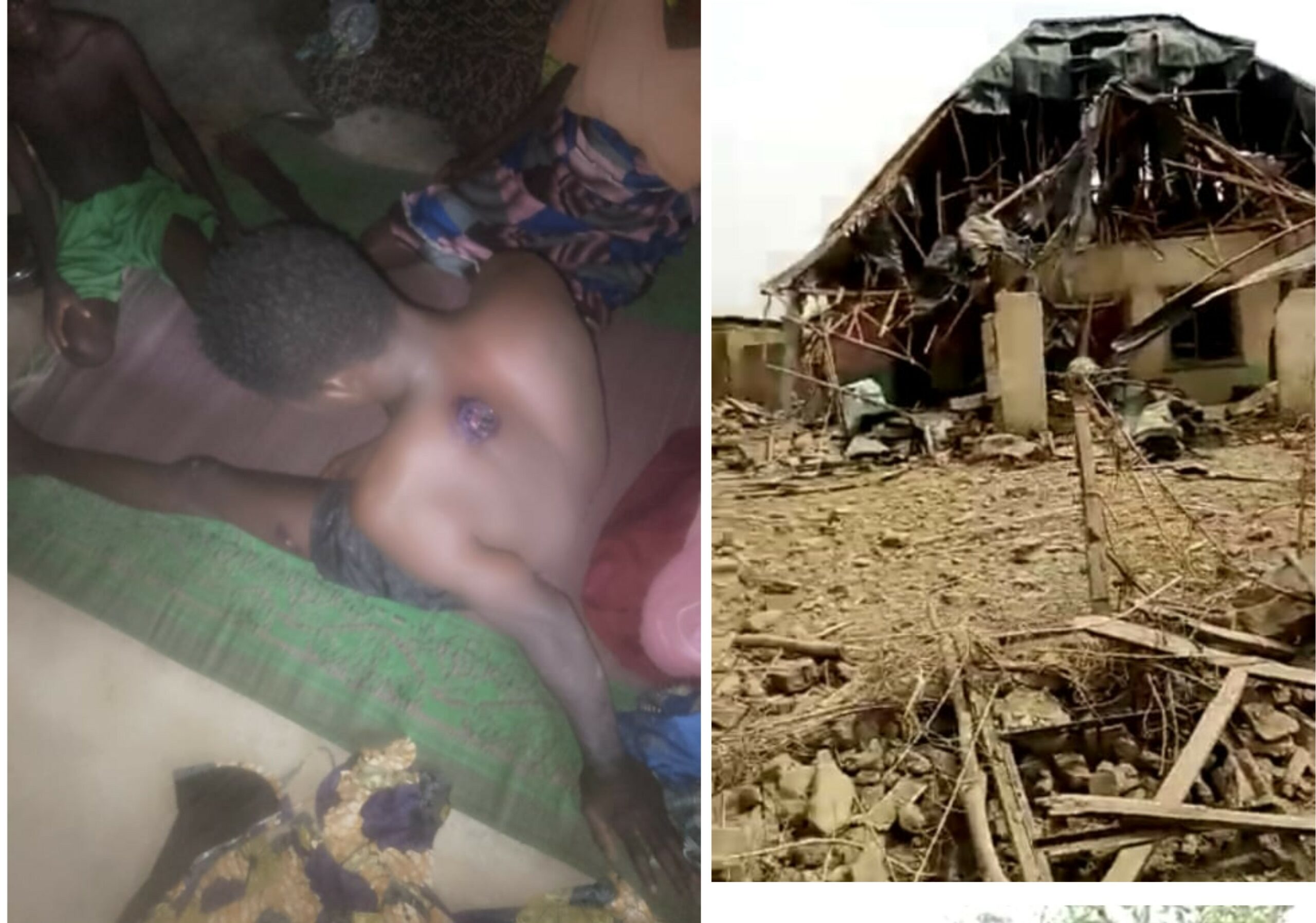
On April 22, Emmanuel Umar, Niger State’s commissioner for chieftaincy affairs and internal security, claimed only terrorists were occupying the Kurebe landscape during the military air raid. The narrative pushed by the state government to justify the military’s reckless bombing was that civilians in the community had vacated the place for displacement camps due to repeated terror attacks.
“To the best knowledge of the state government, there are no civilians resident in these areas for some time now due to the infiltrations and activities of the terrorists which forced the locals to seek shelter as IDPs in other parts of the state,” Mr Umar said in a statement. “While the state government appreciates the victories recorded during these operations, it also looks forward to sustained operations to eradicate bandits from the state.”
But PREMIUM TIMES investigation, including on-the-ground reporting, undercover filming, and interviews with dozens of people among Kurebe civilian population, countered the state officials’ claims. The Kurebe community is completely detached from the basic realities of the 21st century: no roads, no hospitals, no schools, and no good telecommunication network to connect with the people conveniently. These factors made it easy for the government to deny the military bombardment, claiming the community was occupied mainly by terrorists.
For two months — starting from the week the incident happened — we had deployed locals in Kurebe to film the scene of the airstrike and households affected by the military raid. We finally obtained a series of footage that established the community is dominated by vulnerable civilians at the mercy of invading Boko Haram terrorists.
In one such footage — shot moments before burying the girls — wailing mothers, who strapped their babies at the back, appear embittered by the military raid. Other women appeared shocked, amid tears, seeing the mutilated bodies of the girls covered with blood-soaked clothing. “We accept our faith,” one of them is heard saying in a mixture of the Hausa and Gwari languages. “We believe this is the will of God.”
In another short video, we see family houses destroyed by the air force’s jet; fallen tall trees, armless men said to be caught in a catch-22 situation; children who appear too little to understand the tragedy that had befallen the land, and other personal effects belonging to the civilians — such as a local pepper-grinding machine and a motorcycle.
PREMIUM TIMES obtained pictures of persons badly injured during the military raid, including the footage of a boy whose back was hit and wounded by the flying shrapnels. A man, Danjuma Idris, whose house was destroyed by the military, said he now takes shelter in Gwada, a community near the state capital.
Also, for three days in June, our reporter monitored the movements of Kurebe residents, who had reasons to travel from the community to Minna city. Many of them whom we interviewed said the terrorists operating in Kurebe always emerge from the neighbouring Kaduna forests. Most of the terrorists could only speak foreign languages such as French and Arabic, the Kurebe villagers told PREMIUM TIMES.
“It’s all lies,” said Haruna Kurebe, a community leader. “The government gave wrong intelligence to the military by saying all civilians had left Kurebe. This is my son, he just came from the place last week. Look at this my daughter too, she also just came from the place.”
From the Niger govt to the humanitarian ministry
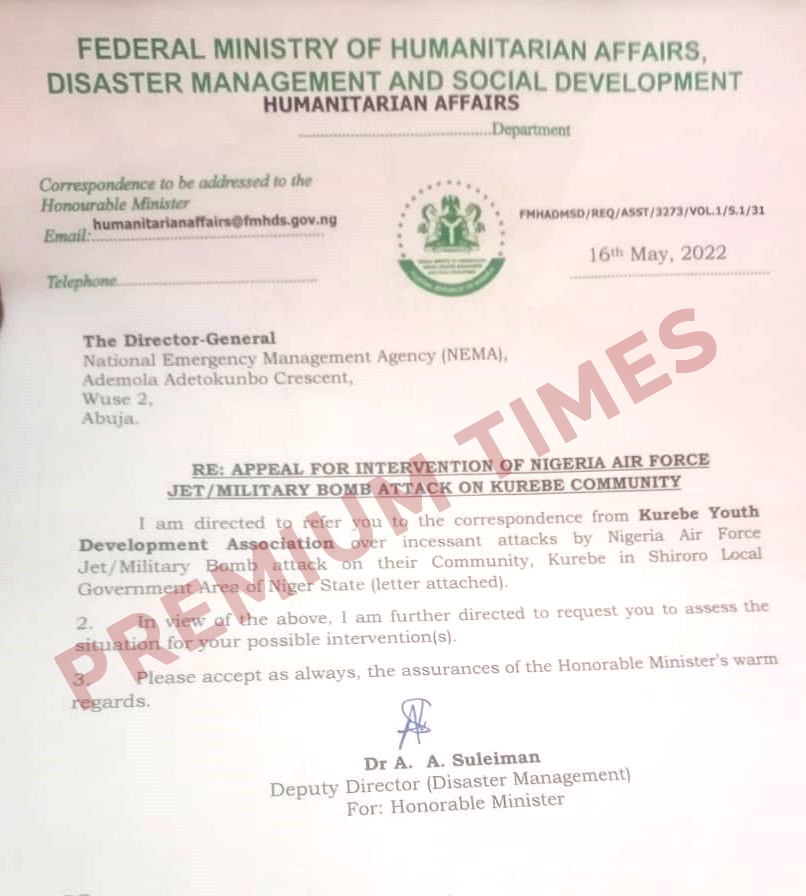
On April 19, before the story of the military raid became public knowledge, a group of Kurebe youth wrote the Niger State Government, informing the governor of the bomb attack in the community. The letter, which was acknowledged by the government, was accompanied by pieces of evidence of the killing of the six children and extensive destruction of properties.
“We call on Mr Governor to lunch investigation in order to find out why peace-loving people will come under attack from the military that is supposed to protect them,” the letter reads. But rather than grant the appeal of the aggrieved people, the state government denied the incident despite indisputable pieces of evidence presented by the group.
Meanwhile, the young residents of Kurebe had also written to the Federal Ministry of Humanitarian Affairs, Disaster Management and Social Development, led by Sadiya Farouq, seeking its intervention, after providing proof of the bloody attack.
“As a result of this attack, some residents of the Kurebe community deserted and relocated to the nearby village in the Udawa area of Chukun LGA of Kaduna State,” the letter reads. “In this regard, we are appealing to the Hon. Minister to assist our people who are now seeking shelter in Udawa with the provision of basic needs such as food items, blankets, mattresses, pillows, and so on.”
Responding to the youths’ appeal on May 17, the humanitarian ministry wrote the National Emergency Management Agency (NEMA), asking its Director-General, Mustapha Habib, to “assess the situation for your possible intervention.” However, no intervention has been made for the victims of the air force attack as of the time of publishing this story.
Authorities evade PREMIUM TIMES’ questions
Contacted for reactions to the outcome of our investigation, the Niger State Government and the Nigerian Air Force failed to answer PREMIUM TIMES questions.
Mr Gabkwet, the air force’s spokesman, who had earlier failed to comment when the incident happened, insisted that all questioning on the matter should be directed to the state government. Asked to say the stand of the air force on the attack, the spokesman asked the reporter to talk to the “commissioner for (internal) security in Niger state”.
Meanwhile, the journalist had earlier contacted Mr Umar, the state’s commissioner for internal security, multiple times over the phone but he failed to respond. A PREMIUM TIMES text requesting proof to back his claim that only terrorists were living in Kurebe at the time of the military raid was also ignored.
The culture of misfire and denial
The bombings of civilians in conflict zones by the Nigerian Air Force — due to operational errors or lack of proper intelligence gathering — are well documented but are hardly investigated. The military often denies killing civilians in place of terrorists, leaving several harmless communities devastated without accountability. One such scenario is the bombing of the little Kurebe children and the eventual denial. But this is not an isolated case.
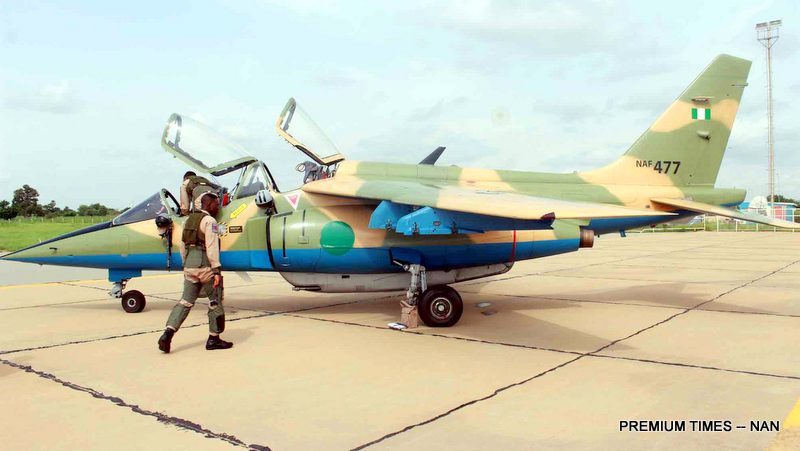
In July 2021, an aerial bombardment by the air force left several wedding guests dead around the Genu town in Niger State but the authorities denied it and no accountability followed. A day after this fatal incident, a fighter jet targeting terrorists also claimed the lives of a woman and her four children in the Sububu area of Zamfara State.
The error of making civilians the victims of war during counter-terrorism operations are clearly violating international humanitarian laws. The Geneva Convention, for example, preaches the assurance of safety for civilians caught in armed conflicts. Article III of the convention enjoins the protection of “persons taking no active part in hostilities… And shall in all circumstances be treated humanely.”
Experts said armed forces must take feasible precautions, in accordance with the international human rights statutes, to ensure the safety of innocent civilians in terror zones. When such accidental bombings happen, the standard is that the government should investigate to avoid future occurrences and compensate victims, said Daniel Ugwu, a Nigerian human rights researcher.
EDITOR’S NOTE: Some of the sources interviewed for this story have requested that their identities should not be revealed for security reasons. This is the first of a reporting series on the infiltration of Boko Haram elements in Niger communities and how the military intervention is causing civilian fatalities.
PREMIUM TIMES






